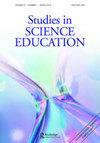更好地理解量子物理入门课程中概念上的困难
IF 9.9
2区 教育学
Q1 EDUCATION & EDUCATIONAL RESEARCH
引用次数: 16
摘要
量子物理教学研究经常探讨学生在推理中识别常见模式的概念困难。QP的抽象性往往是学生概念困难的根源。由于这种抽象性,学生在理解QP现象时会求助于常识推理或经典思维。在这篇文献综述中,对“抽象性”进行了仔细的调查和细致入微的分析,以揭示学生体验到抽象性的原因。在QP的抽象性质下,学生概念困难的四个原因可以分类。这些原因是:学生们努力a)将QP的数学形式与物理世界中的经历联系起来;b) 解释违反直觉的QP现象和概念;c) 从确定性世界观过渡到概率性世界观;以及d)理解语言在表达量子现象、概念和物体方面的局限性。结合这四个原因,我们可以更好地理解QP中概念困难的起源,以及为什么这些困难会随着时间的推移而持续存在。讨论了这些发现对研究和教学实践的启示。本文章由计算机程序翻译,如有差异,请以英文原文为准。
Towards a better understanding of conceptual difficulties in introductory quantum physics courses
ABSTRACT Research on teaching and learning quantum physics (QP) frequently explores students’ conceptual difficulties to identify common patterns in their reasoning. The abstractness of QP is often found to be at the origin of students’ conceptual difficulties. Due to this abstract nature students resort to common sense reasoning or classical thinking when they make meaning of QP phenomena. In this literature review, the ‘abstractness’ is closely investigated and nuanced to uncover what reasons for the abstractness students experience. Four reasons for students’ conceptual difficulties can be categorised under the abstract nature of QP. These reasons are that students struggle a) to relate the mathematical formalism of QP to experiences in the physical world; b) to interpret counterintuitive QP phenomena and concepts; c) to transit from a deterministic to a probabilistic worldview; and d) to understand the limitations of language to express quantum phenomena, concepts, and objects. Combining these four reasons allows us to better understand the origin of conceptual difficulties in QP and why these difficulties persist over time. The implications of these findings for research and teaching practice are discussed.
求助全文
通过发布文献求助,成功后即可免费获取论文全文。
去求助
来源期刊

Studies in Science Education
EDUCATION, SCIENTIFIC DISCIPLINES-
CiteScore
15.30
自引率
2.00%
发文量
7
审稿时长
>12 weeks
期刊介绍:
The central aim of Studies in Science Education is to publish review articles of the highest quality which provide analytical syntheses of research into key topics and issues in science education. In addressing this aim, the Editor and Editorial Advisory Board, are guided by a commitment to:
maintaining and developing the highest standards of scholarship associated with the journal;
publishing articles from as wide a range of authors as possible, in relation both to professional background and country of origin;
publishing articles which serve both to consolidate and reflect upon existing fields of study and to promote new areas for research activity.
Studies in Science Education will be of interest to all those involved in science education including: science education researchers, doctoral and masters students; science teachers at elementary, high school and university levels; science education policy makers; science education curriculum developers and text book writers.
Articles featured in Studies in Science Education have been made available either following invitation from the Editor or through potential contributors offering pieces. Given the substantial nature of the review articles, the Editor is willing to give informal feedback on the suitability of proposals though all contributions, whether invited or not, are subject to full peer review. A limited number of books of special interest and concern to those involved in science education are normally reviewed in each volume.
 求助内容:
求助内容: 应助结果提醒方式:
应助结果提醒方式:


